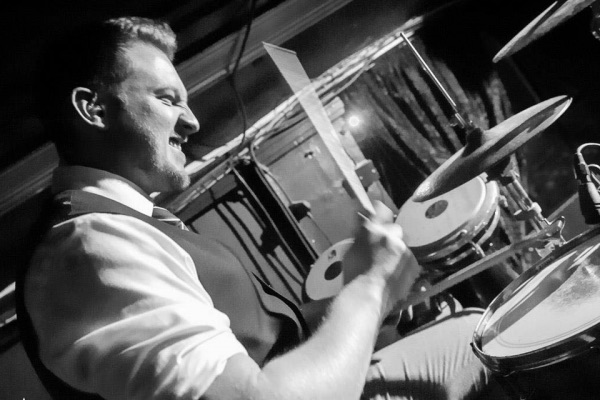How to get the best out of jam nights as a singer
Whether you’re a seasoned pro or just starting out, jam nights can be invaluable for a singer.
At least half my current gigs, and two of my regular bands, have come through people I met at a jam; and I’ve learned so much from hosting, and singing at, jams over the years.
I spoke to four musicians – Joe Nurse, keys player and singer; Robert Johnston, guitarist; Will Scott-Hartley, bassist; and Jake Horn, drummer – who play in the house band for weekly jam nights about what they look for in a singer.
I asked them to be honest about what impresses them, what pisses them off and what would make them want to work with a singer professionally. Here’s what they had to say.

Jules Pitcher singing at Oxfords Jam, Southampton. Photograph by Dan Todd.
Q: Which song(s) should I sing?
It’s always tricky to know which songs to prepare when you don’t know the band and their repertoire. Here are some tips about song choice.
WILL, BASS: Ideally, have a few choices of song that they’d like to sing, ahead of coming up. It’s nice to move to the next tune quickly, which can’t be done if the next singer hasn’t made up their mind.
ROB, GUITAR: There’s a fine balance to be struck between picking songs that most people know and the more obscure, yet delightful songs. The former benefits from the band knowing the songs inside out but they usually have to play them a few times a week, so it can get very tedious!
JOE, KEYS: A singer will always easily impress if they come wanting to do something that is gonna be fun for the band too – not just crowd-pleasers.
JAKE, DRUMS: Generally, house bands at jam nights have a large repertoire of songs, but we are only human! If we don’t know a niche song, no matter how much you love it, it’s great to have a few back-ups.
Q: How do I communicate a song the band doesn’t know too well?
The band will love trying out new songs or ones they don’t get to play often. However, this can be trickier to get right, so here are some pointers on communicating tempo, groove, harmony and structure.
JOE, KEYS: Usually if one member of the band knows the song, it’s enough to get through [it] because they can prep the others quickly beforehand or, even better, signal throughout the song on the fly.
ROB, GUITAR: Talking to each band member is often fine (especially if cueing a solo or similar), but choose your moments; sometimes chatting during a musician soloing or playing a technical part can produce undesirable multitasking! Some [musicians] are better than others
TEMPO AND GROOVE
JAKE, DRUMS: Either sing a rough drum part to the drummer or tell him or her the style of music/a reference track, along with the tempo you want it played at. If you want the track a different tempo to the original, let the drummer know before the song starts, no one likes to be flapped at after a song has started if the singer wants a more chilled, laid back version than the original; sight-reading might be on the music CV, but mind-reading unfortunately isn’t!
WILL, BASS: There are pretty clear terms among musicians for different kinds of groove, knowing if you want rock, hip-hop, reggae, country etc. Most styles revolve around the type of drumbeat so it’s best to have the drummer’s attention. Failing knowing the style just asking for James Brown or the groove from Michael Jackson’s The Way You Make Me Feel will be pretty well understood. Just make sure you know what you’re asking for! Knowing the difference between straight/shuffle goes a long way too.
HARMONY
JOE, KEYS: If it’s a more obscure song choice, having an idea of the chord structure is really handy (don’t just say “oh it goes like this…la la la” *sings melody* – that’s not useful chordal information!)
ROB, GUITAR: The situations that really stand out are when… singers offer a “it’s these chords the whole way through” or “it’s these chords until the bridge, which is…” or “I’ll cue you to go to the bridge” etc. This really helps a band navigate seamlessly through songs they may not have heard before.
STRUCTURE
JAKE, DRUMS: During the performance, unless it’s obvious, let the band know when the transitions from verse to pre-chorus etc are, the more you can let them know, the better!
JOE. KEYS: More intricate structural things could be awkward: 2/4 bars before choruses or maybe an irregular phrase length. A good example is the Bridge of Justin Timberlake’s Can’t Stop The Feeling – the whole bridge is a 9 bar section. Is the drummer prepared or is he going to fill naturally into the chorus after 8 bars?
WILL, BASS: Don’t be super precious about the original song’s arrangement. The chances are there will be at least one musician who hasn’t heard it before, so the super awesome guitar hook (which is sick but doesn’t actually hold the song together) might just have to go.
Q: Is it all about the quality of the voice?
We singers are usually super critical about our voices and we want to give the best vocal performance every time. However, when it comes to impressing your band, you might be surprised what matters to them most.
JOE, KEYS: Depends. For me, tone is the biggest signature of a singer. Riffing and running is impressive, but there are many great singers who can riff and run but they might not sound alike. Vocal tone sets a singer apart more than anything.
ROB, GUITAR: Definitely not! I always value musical empathy far higher than technical prowess. In terms of the voice itself, I always look out for great tone and control, but that’s usually all I look for in terms of technique – you can usually tell that someone’s good within a few bars.
WILL, BASS: For anything musical, I’ll forgive anyone who is aware of themselves and can apologise if they need to, I favour humility over talent all the time. Missing half the verse is not a problem unless you then look annoyed with us for not going to the chorus with you. And if you roll your eyes and mouth “sorry” at us, we can have a laugh about it.
JAKE, DRUMS: The quality of the voice is a big part, however it isn’t everything. If you are a good singer that is easy to get along with, friendly and communicates well with the band, you are much more likely to get work than someone who is an amazing singer, but a complete diva.
Q: What else matters to you?
JOE, KEYS: On function gigs, singers who get stuck in by coiling cables and plugging mics into the desk gain more respect than those who stand around not helping in any way. Some basic knowledge of PA systems, mixers, cables and monitors can go a long way… especially singers.
WILL, BASS: Of course a good voice is a good voice, but the measure of being an employable musician is how prepared, on-time, responsive, professional and friendly someone is. Plenty of really good musicians don’t get booked because they haven’t got it together.
JAKE, DRUMS: Being down to earth is a big thing too. At a gig, 70-80% of your time is going to be travelling, hanging out backstage and 20-30% of your time performing. If you have a huge ego that gives you confidence on stage, but causes big issues offstage, that is big no-no for me.
ROB, GUITAR: Having the confidence to take the lead but the respect to let the musicians express themselves, without turning it into a contest is a fine balance to strike! Adaptability and professionalism are good attributes to work on.
Q: What would impress you?
I asked, what would impress a musician enough to make them connect with a singer and take his/her details for a gig or band opportunity in the future?
JAKE, DRUMS: There’s nothing better than a singer who can perform, has the confidence to lead the song, give the band solos, communicate where they are in the song, and give the band a cue when they want to repeat sections, or if they want to end. When you are at a jam and everything clicks, everyone in the room knows it.
JOE, KEYS: Are they sensitive to the guitar player dying to do a shredding solo between the bridge and the final double chorus? Maybe the keyboard player knows the tune which the rest of the band don’t know – are you riffing all over their intro that’s setting up a groove for the band to feed off for the rest of the song?
ROB, GUITAR: What makes people stand out is their attitude during the instrumental break – some are often itching to get going again and cut the musicians off prematurely, whereas others turn and watch the musicians, enjoying the moment, and wait for a cue to come back in/offer the other musicians a solo or wait patiently for the music to dictate where to go next.
WILL, BASS: For me, I love singers who can really jam with us. I had a really fun residency going with a band who would just improvise crazy funk for hours, but it stayed entertaining because the singer did the James Brown/Prince/MJ thing and just sang nonsense/made-up lyrics.

A singer gives it his all on stage at Oxfords Jam, Southampton. Image by DaVincent Photography.
Q: What are your bug bears? / What pisses you off?!
JAKE, DRUMS: It gets me is when someone doesn’t know the song they’ve asked for so when the band plays it correctly, the singer comes in early and then turns around and gives everyone evils. Everyone has off gigs, but don’t blame your mistakes on others. Take some responsibility!
JOE, KEYS: If we’re discussing a song that the singer wants to do but we’re not 100% sure of the chord progression for instance, don’t start slagging off the musicians down the mic to the crowd whilst we’re trying to facilitate a song that’ll make you look and sound great. You want and need the song to go well so give us a moment to make sure we play it the best we can for you.
ROB, GUITAR: The main thing that I dislike about jams in general is having to play songs exactly like the original. So as a singer it’s important to continue confidently if the song behind you sounds a bit different – and don’t be afraid to take songs in different directions.
WILL, BASS: …“Oh just wing it, you’ll be fine”. Thanks but no thanks. We do wing it a lot of the time, but we have standards and if one of us knows the tune, they will make the call on whether we’ll get away with it. So sorry, Bohemian Rhapsody is off.
DO’S AND DONT’S
Lastly, some vital dos and don’ts from me…
DON’T
Don’t use anyone’s instruments or touch the mixing desk without asking.
Don’t say: “I don’t know what to sing”. Choose your songs in advance.
Don’t get annoyed when the band doesn’t know your choice of song.
Don’t assume you will get to sing with the house band. Be aware you might have other musicians who are also learning and/or nervous.
Don’t get drunk! Err on the side of professional. You never know who’s watching (even when you’re not singing).
Don’t think you have to be good at this stuff straight off the bat. Go regularly and treat it as a chance to improve. Be humble and stick around to pick up tips from chatting to and watching other singers.
DO
Do turn up early enough to put your name on the list or introduce yourself to the host/band.
Do say hello. Sometimes it’s loud so introductions aren’t possible but at least make eye contact with each member of the band and smile.
Do know the key of the song. “Original key” may be enough but it’s worth being sure.
Do know the structure and practise cueing the changes while you’re singing.
Do know the chords – if it’s jazz, bring a chart, but only if you know it’s correct. If you don’t play, get a jazzer friend to check it.
Do make time for solos and watch (don’t sing or chat through it!)
Do thank the band. Getting applause for the house band always goes down well.
Do stay afterwards to support other musicians and singers and make friends.
And now, I’m going to let drummer Jake have the last word:
“Jam nights on the whole are very friendly, fun places to play and meet new musicians and friends.
I know that if it wasn’t for local open mics (big shout to Monday Night Blues in Southampton
which sadly has now closed its doors), I wouldn’t have a career in music.
You can meet some great people, great musicians, start bands,
be it original or function, and really make an impact to your career and life!”
- Jake Horn, Drummer
Special thanks to Joe, Will, Jake and Rob for taking the time to contribute to this article.

Joe Nurse MMus – Joe is a session musician, composer, musical director and teacher. He has performed alongside artists such as Liane Carroll, Joe Stilgoe & Soweto Kinch and in venues from Royal Majesty’s Theatre to Disneyland Paris. Joe is the host piano vocalist for the Oxfords Jam night in Southampton. joenursemusic.co.uk

Will Scott-Hartley BSc – Will is a bassist, double bassist, producer, arranger and teacher based in Hampshire. Outside of co-hosting the Oxfords Jam in Southampton every week, he works as a session musician for a number of contemporary jazz projects across the south of England. He also plays keys. wsh-music.com

Jake Horn BA (Hons) – Jake is a professional drummer based in London with more than 10 years live drumming experience including touring both in the UK and Europe, playing a wide range of styles and genres. He averages over 200 shows per year and has played for Aidan Martin (X Factor), Shayne Ward, London’s Real Voices Choir, and performed at the Singapore F1. Follow Jake on Instagram: @jakethedrummer

Robert Johnston MMus – Robert is a professional guitarist and bassist, as well as an instrumental tutor. He has been playing the guitar for around 15 years and performing professionally for over 5 years. As a versatile musician fluent in several styles, Robert performs in several bands, from function/wedding outfits to a big band and funk combo. Follow Robert on Instagram @robjohnstonnn
Read original article as published by iSing magazine.
You might also like to read my article: Seven reasons why singers should perform at jam nights